(完整版)新概念英语第一册笔记完整版(最新整理)
新概念英语第一册Lesson1~6课文翻译及学习笔记(最新)
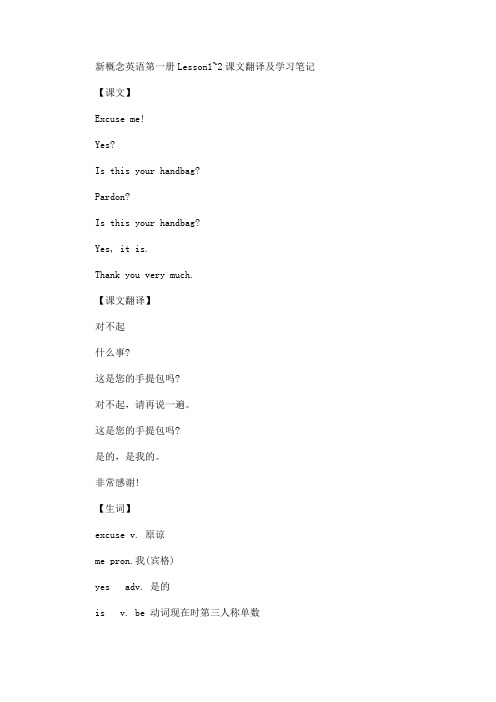
新概念英语第一册Lesson1~2课文翻译及学习笔记【课文】Excuse me!Yes?Is this your handbag?Pardon?Is this your handbag?Yes, it is.Thank you very much.【课文翻译】对不起什么事?这是您的手提包吗?对不起,请再说一遍。
这是您的手提包吗?是的,是我的。
非常感谢!【生词】excuse v. 原谅me pron.我(宾格)yes adv. 是的is v. be 动词现在时第三人称单数this pron.这your adj. 你的,你们的handbag n. (女用)手提包pardon int. 原谅,请再说一遍it pron.它thank you 感谢你(们)very much 非常地【知识点讲解】1. Excuse me 是一个很常用的词组,通常用来引起对方注意或是搭话。
它的字面意思是“原谅+我”,但一般不用来跟人道歉,道歉还是应该用sorry。
2. 文中的yes有两种意思:其一是有人叫你时,回答对方;其二是表示肯定。
3. pardon本身也是“原谅”的意思,这里的意思是“不好意思我没有听清楚,请再说一遍”。
要对方重复,也可以说"Sorry?"4. Is this your handbag? 这是你的手提包吗?这是疑问句的句型,变成叙述句应该是:This is your handbag. 这是你的包。
5. handbag,一般指女生用的手提包。
钱包是purse,男生的公文包是briefcase。
新概念英语第一册Lesson3~4课文翻译及学习笔记【课文】My coat and my umbrella please.Here is my ticket.Thank you, sir.Number five.Here's your umbrella and your coat.This is not my umbrella. Sorry sir.Is this your umbrella? No, it isn't.Is this it?Yes, it is.Thank you very much. 【课文翻译】请把我的大衣和伞拿给我。
新概念第一册笔记整理
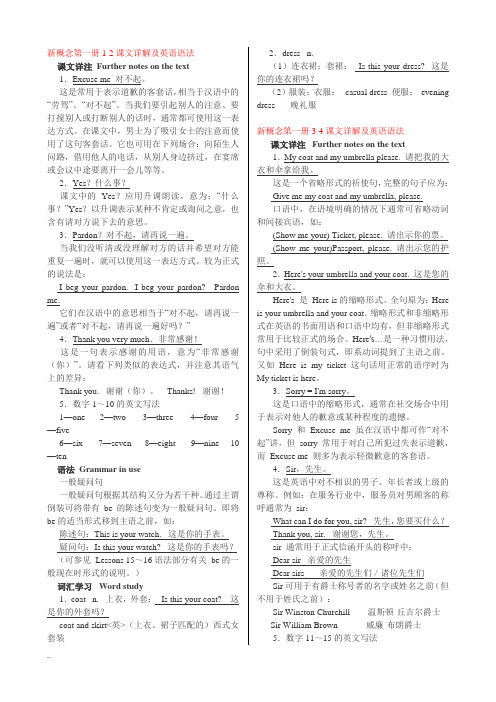
新概念第一册1-2课文详解及英语语法课文详注Further notes on the text1.Excuse me 对不起。
这是常用于表示道歉的客套话,相当于汉语中的“劳驾”、“对不起”。
当我们要引起别人的注意、要打搅别人或打断别人的话时,通常都可使用这一表达方式。
在课文中,男士为了吸引女士的注意而使用了这句客套话。
它也可用在下列场合:向陌生人问路,借用他人的电话,从别人身边挤过,在宴席或会议中途要离开一会儿等等。
2.Yes?什么事?课文中的Yes?应用升调朗读,意为:“什么事?”Yes?以升调表示某种不肯定或询问之意,也含有请对方说下去的意思。
3.Pardon?对不起,请再说一遍。
当我们没听清或没理解对方的话并希望对方能重复一遍时,就可以使用这一表达方式。
较为正式的说法是:I beg your pardon. I beg your pardon? Pardon me.它们在汉语中的意思相当于“对不起,请再说一遍”或者“对不起,请再说一遍好吗?”4.Thank you very much.非常感谢!这是一句表示感谢的用语,意为“非常感谢(你)”。
请看下列类似的表达式,并注意其语气上的差异:Thank you. 谢谢(你)。
Thanks! 谢谢!5.数字1~10的英文写法1—one 2—two 3—three 4—four 5—five6—six 7—seven 8—eight 9—nine 10—ten语法Grammar in use一般疑问句一般疑问句根据其结构又分为若干种。
通过主谓倒装可将带有be的陈述句变为一般疑问句。
即将be的适当形式移到主语之前,如:陈述句:This is your watch. 这是你的手表。
疑问句:Is this your watch? 这是你的手表吗?(可参见Lessons 15~16语法部分有关be的一般现在时形式的说明。
)词汇学习Word study1.coat n. 上衣,外套:Is this your coat? 这是你的外套吗?coat and skirt<英>(上衣、裙子匹配的)西式女套装2.dress n.(1)连衣裙;套裙:Is this your dress? 这是你的连衣裙吗?(2)服装;衣服:casual dress 便服;evening dress 晚礼服新概念第一册3-4课文详解及英语语法课文详注Further notes on the text1.My coat and my umbrella please. 请把我的大衣和伞拿给我。
新概念英语第一册重点词汇和语法(完整版)
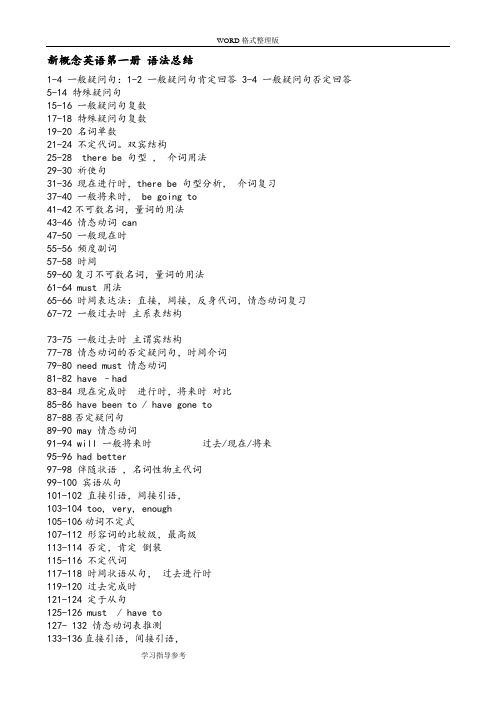
新概念英语第一册语法总结1-4 一般疑问句:1-2 一般疑问句肯定回答 3-4 一般疑问句否定回答5-14 特殊疑问句15-16 一般疑问句复数17-18 特殊疑问句复数19-20 名词单数21-24 不定代词。
双宾结构25-28 there be 句型,介词用法29-30 祈使句31-36 现在进行时,there be 句型分析,介词复习37-40 一般将来时, be going to41-42不可数名词,量词的用法43-46 情态动词 can47-50 一般现在时55-56 频度副词57-58 时间59-60复习不可数名词,量词的用法61-64 must 用法65-66 时间表达法:直接,间接,反身代词,情态动词复习67-72 一般过去时主系表结构73-75 一般过去时主谓宾结构77-78 情态动词的否定疑问句,时间介词79-80 need must 情态动词81-82 have –had83-84 现在完成时进行时,将来时对比85-86 have been to / have gone to87-88否定疑问句89-90 may 情态动词91-94 will 一般将来时过去/现在/将来95-96 had better97-98 伴随状语,名词性物主代词99-100 宾语从句101-102 直接引语,间接引语,103-104 too, very, enough105-106动词不定式107-112 形容词的比较级,最高级113-114 否定,肯定倒装115-116 不定代词117-118 时间状语从句,过去进行时119-120 过去完成时121-124 定于从句125-126 must / have to127- 132 情态动词表推测133-136直接引语,间接引语,137-138 条件状语从句139-140宾语从句141-144 被动语态Lesson 1 Excuse me1. Words1) excuse (1)重音(2)与sorry 的区别(3)Excuse 用的不同场景a. 请别人让路b. 引起别人的注意c. 打断别人的谈话d. 可以当n. 借口 eg. No excuse. 别找借口,没有借口。
(完整版)新概念英语第一册知识点总结-

第一册重点语法知识点都包含:时态:一般现在时,现在进行时,现在完成时,一般过去时,过去进行时,过去完成时,一般将来时,过去将来时。
词性:动词现在分词、动词的过去式和过去分词。
形容词、副词的比较级与最高级。
助动词、情态动词、半情态动词的使用。
动词不定式。
反身代词、不定代词。
特殊疑问词。
句式:简单句、并列句、复合句(定语从句、状语从句、宾语从句)。
语态:被动语态。
结构:There be结构。
语序:倒装。
(新概念英语一册1-144课的所固定搭配短语)I beg your pardon 请您在重复(说)一遍 Nice to meet you(too)(我也)很高兴见到你Look at…看… How do you do 你好 Be careful 小心A loaf of 一个 A bar of 一条 A bottle of 一瓶 A pound of一磅 Half a pound of 半磅 A quarter of 四分之一 A tin of 一听 Hurry up 快点 Next door 隔壁 Black coffee 不加牛奶的咖啡White coffee 加牛奶的咖啡 Come home from school 放学回家Come home from work 下班回家 At the moment 此刻What‟s the time? 几点钟? Come upstairs 上楼 Come downstairs 下楼Hundreds of…数以百计的… On the way home 在回家的途中This morning 今天早晨 This afternoon 今天下午This evening 今天晚上 tonight 今天夜里Yesterday morning 昨天早晨 Yesterday afternoon 昨天下午 Yesterday evening昨天晚上 Last night 昨天夜里The day before yesterday in the morning 前天早晨The day before yesterday in the afternoon 前天下午The day before yesterday in the evening 前天晚上The night before last 前天夜间A low mark 分数很底 A high mark 分数很高 She said to herself 她心中暗想 The way to…到…的走法In fashion 流行的,时髦的I‟m afraid…我恐怕…I‟m sure…我确信,我肯定… A lot of 许多(用于肯定句)At all 丝毫、更本、一点也不 Going on holiday 度假Have been to…到过… All the time 一直,始终Have been to…到过… Drive into…撞倒…For sale 供出售、出售 Have the last word 最后决定、最后才算The R.A.F. 英国皇家空军 Return ticket 往返票Next door to…与…相邻,在…隔壁 In five hours‟time在五小时之后。
新概念第一册每课知识点整理

新概念第一册每课知识点整理Lesson 1 - Excuse me!一、重点单词。
1. excuse.- 作动词,意为“原谅;宽恕”,例如:Excuse me.(打扰一下。
)- 作名词,意为“借口;理由”,如:Don't make excuses.(不要找借口。
)2. me.- 人称代词宾格,“我”,在句中作宾语,如:Give it to me.(把它给我。
)二、重点句型。
1. Excuse me!- 用于引起别人注意、请求让路、打断别人说话等场合,是比较礼貌的用法。
三、语法点。
简单的日常交际用语的使用。
Lesson 2 - Is this your…?一、重点单词。
1. pen.- 名词,“钢笔”。
2. pencil.- 名词,“铅笔”。
3. book.- 名词,“书”。
4. watch.- 名词,“手表”;也可作动词,“观看”,如:watch TV(看电视)。
二、重点句型。
1. Is this your pen?- 这是一般疑问句,其结构为“be动词(is/are等)+主语+其他”,回答可以是“Yes, it is.”或者“No, it isn't.”三、语法点。
1. 一般疑问句的构成与回答。
2. 指示代词this的用法,用来指代离说话者较近的人或物。
Lesson 3 - Sorry, sir.一、重点单词。
1. umbrella.- 名词,“雨伞”。
2. please.- 副词,用于请求别人做某事时表示礼貌,如:Please open the window.(请打开窗户。
)二、重点句型。
1. Is this your umbrella?- 同Lesson 2中的一般疑问句结构。
2. Sorry, sir.- “sorry”表示歉意,“sir”是对男性的尊称。
三、语法点。
1. 继续巩固一般疑问句。
2. 尊称“sir”的用法。
Lesson 4 - Is this your…?一、重点单词。
新概念英语一册笔记
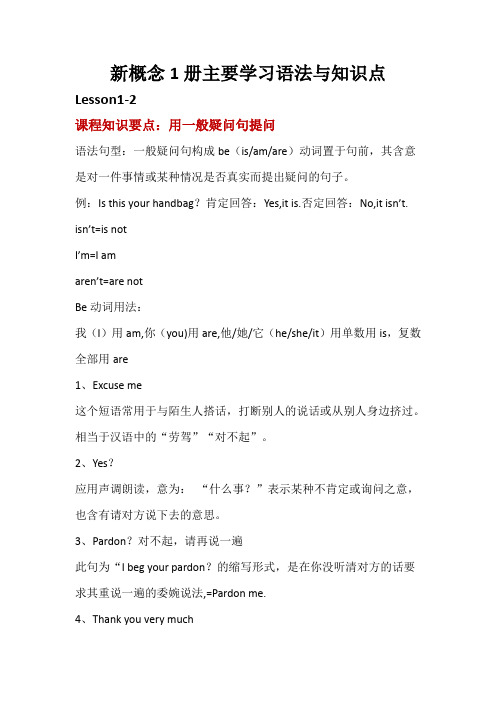
新概念1册主要学习语法与知识点Lesson1-2课程知识要点:用一般疑问句提问语法句型:一般疑问句构成be(is/am/are)动词置于句前,其含意是对一件事情或某种情况是否真实而提出疑问的句子。
例:Is this your handbag?肯定回答:Yes,it is.否定回答:No,it isn’t. isn’t=is notI’m=I amaren’t=are notBe动词用法:我(I)用am,你(you)用are,他/她/它(he/she/it)用单数用is,复数全部用are1、Excuse me这个短语常用于与陌生人搭话,打断别人的说话或从别人身边挤过。
相当于汉语中的“劳驾”“对不起”。
2、Yes?应用声调朗读,意为:“什么事?”表示某种不肯定或询问之意,也含有请对方说下去的意思。
3、Pardon?对不起,请再说一遍此句为“I beg your pardon?的缩写形式,是在你没听清对方的话要求其重说一遍的委婉说法,=Pardon me.4、Thank you very much非常感谢!当别人帮助了你,你表示感谢即用此句。
=Thanks/Thank you/Tanks a lot.5、数字1~10的英文写法1—one 2—two 3—three 4—four 5—five 6—six 7—seven 8—eight 9—nine 10—tenLesson3-4课文概述要点:祈使句1、My coat and my umbrella please.请把我的大衣和伞拿给我。
这是一个省略形式的祈使句,完整的句子应为:Give me my coat and my umbrella, please.Please可放句首也可放句尾。
口语中,在语境明确的情况下通常可省略动词和间接宾语,如: (Show me your) Ticket, please.请出示你的票。
(Show me your)Passport, please.请出示您的护照。
(完整版)新概念第一册笔记整理
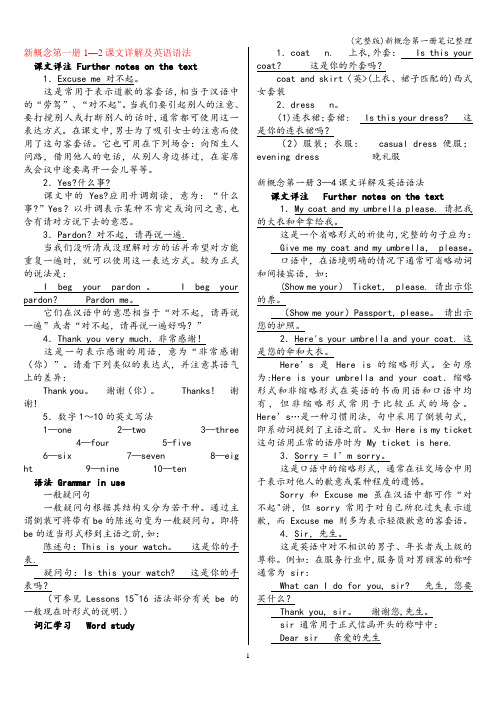
新概念第一册1—2课文详解及英语语法课文详注 Further notes on the text1.Excuse me 对不起。
这是常用于表示道歉的客套话,相当于汉语中的“劳驾”、“对不起"。
当我们要引起别人的注意、要打搅别人或打断别人的话时,通常都可使用这一表达方式。
在课文中,男士为了吸引女士的注意而使用了这句客套话。
它也可用在下列场合:向陌生人问路,借用他人的电话,从别人身边挤过,在宴席或会议中途要离开一会儿等等。
2.Yes?什么事?课文中的 Yes?应用升调朗读,意为:“什么事?”Yes?以升调表示某种不肯定或询问之意,也含有请对方说下去的意思。
3.Pardon?对不起,请再说一遍.当我们没听清或没理解对方的话并希望对方能重复一遍时,就可以使用这一表达方式。
较为正式的说法是:I beg your pardon。
I beg your pardon? Pardon me。
它们在汉语中的意思相当于“对不起,请再说一遍”或者“对不起,请再说一遍好吗?”4.Thank you very much.非常感谢!这是一句表示感谢的用语,意为“非常感谢(你)”。
请看下列类似的表达式,并注意其语气上的差异:Thank you。
谢谢(你)。
Thanks! 谢谢!5.数字1~10的英文写法1—one 2—two 3—three 4—four 5-five6—six 7—seven 8—eig ht 9—nine 10—ten语法 Grammar in use一般疑问句一般疑问句根据其结构又分为若干种。
通过主谓倒装可将带有be的陈述句变为一般疑问句。
即将be的适当形式移到主语之前,如:陈述句:This is your watch。
这是你的手表.疑问句:Is this your watch? 这是你的手表吗?(可参见 Lessons 15~16语法部分有关 be的一般现在时形式的说明.)词汇学习 Word study1.coat n. 上衣,外套: Is this your coat?这是你的外套吗?coat and skirt〈英>(上衣、裙子匹配的)西式女套装2.dress n。
新概念英语一笔记
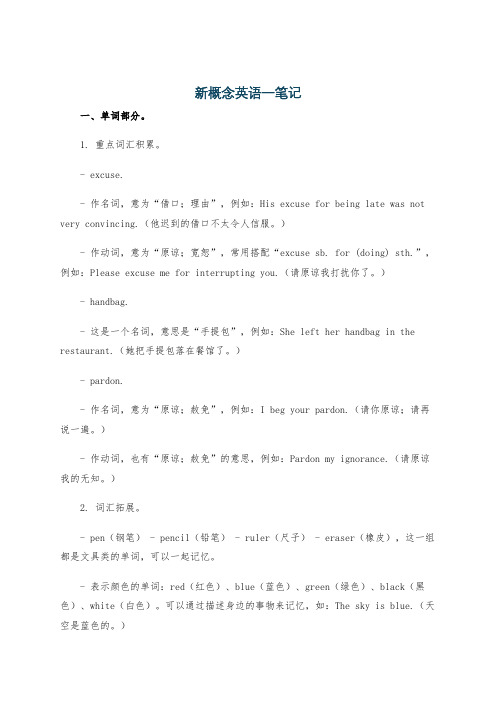
新概念英语一笔记一、单词部分。
1. 重点词汇积累。
- excuse.- 作名词,意为“借口;理由”,例如:His excuse for being late was not very convincing.(他迟到的借口不太令人信服。
)- 作动词,意为“原谅;宽恕”,常用搭配“excuse sb. for (doing) sth.”,例如:Please excuse me for interrupting you.(请原谅我打扰你了。
)- handbag.- 这是一个名词,意思是“手提包”,例如:She left her handbag in the restaurant.(她把手提包落在餐馆了。
)- pardon.- 作名词,意为“原谅;赦免”,例如:I beg your pardon.(请你原谅;请再说一遍。
)- 作动词,也有“原谅;赦免”的意思,例如:Pardon my ignorance.(请原谅我的无知。
)2. 词汇拓展。
- pen(钢笔) - pencil(铅笔) - ruler(尺子) - eraser(橡皮),这一组都是文具类的单词,可以一起记忆。
- 表示颜色的单词:red(红色)、blue(蓝色)、green(绿色)、black(黑色)、white(白色)。
可以通过描述身边的事物来记忆,如:The sky is blue.(天空是蓝色的。
)二、语法部分。
1. 一般现在时。
- 概念:表示经常发生的动作或存在的状态。
- 结构:- 主语为第三人称单数(he/she/it等)时,动词要加 -s或 -es。
例如:He likes reading books.(他喜欢读书。
)- 主语为第一人称(I)、第二人称(you)和复数(they/we等)时,动词用原形。
例如:I play football every Sunday.(我每个星期天踢足球。
)- 时间状语:often(经常)、usually(通常)、sometimes(有时候)、every day(每天)等。
精心整理新概念英语第一册全套笔记(语法点+配套练习+答案共665页)

Lesson1-2Is this your handbag?一、单词分类二、课文复习Excuse me!Yes?Is this your handbag?Pardon?Is this your handbag?Yes,it is.Thank you very much三、课文重点Thank you very much.=Thanks a lot.Thank you verymuch.You’re welcome./That’s all right.Thanks a lot.四、语法解析1.主格放在句首,作主语宾格放在动词或介词后,作宾语1.I love my mother.She loves me.(I)2.We are family.(we)3.Look at them.They are listening to the teacher carefully.(they)4.Are you(you)Mr.Zhang?5.Mary is waiting for him(he).形物代后跟名词,不能单独存在1.Is this your house?(you)2.I do my homework every day.(I)3.Sally is here.That is her car.(she)4.What is your name?(you)5.Look at my(I)dress.Is it beautiful?名物代用于替代前面提到的名词,后面不再跟名词1.Whose pen is it?It’s his(he).2.My cup is red and yours(you)is blue.3.Is this your handbag?Yes,it’s mine.4.Is that your key?No,it isn’t.It’s hers(she).5.That is not my bike.Mine is new.(I)2.陈述句变一般疑问句--变化规则:1.找到be动词,大写提句首2.人称做变化:my—your,our—your3.其它部分照抄4.句号变问号练习:This is his pen.变一般疑问句Is this his pen?This is her pencil.变一般疑问句Is this her pencil?This is their car.变一般疑问句Is this their car?This is its book.变一般疑问句Is this its book?This is your car.变一般疑问句Is this your car?This is my dog.变一般疑问句Is this your dog?This is our dog.变一般疑问句Is this your dog?五、单词练习1.There is that,here is t his.2.Thanks means(意思是)t hank you.3.Thanks a lot means thank you v ery much.4.A boy,he;a girl,she;a dog,i t.5.You are my friend,I am y our friend.6.When you want to sneeze(打喷嚏),you should(应该)say excuse me.。
新概念英语第一册1-72学习笔记要点(DOC)

Lessons 1-2课文详注Further notes on the text1.Excuse me 对不起。
这是常用于表示道歉的客套话,相当于汉语中的“劳驾”、“对不起”。
当我们要引起别人的注意、要打搅别人或打断别人的话时,通常都可使用这一表达方式。
在课文中,男士为了吸引女士的注意而使用了这句客套话。
它也可用在下列场合:向陌生人问路,借用他人的电话,从别人身边挤过,在宴席或会议中途要离开一会儿等等。
2. Yes?什么事?课文中的Yes ?应用升调朗读,意为:“什么事?” Yes?以升调表示某种不肯定或询问之意,也含有请对方说下去的意思。
3. Pardon ?对不起,请再说一遍。
当我们没听清或没理解对方的话并希望对方能重复一遍时,就可以使用这一表达方式。
较为正式的说法是:I beg your pardon.I beg your pardon?Pardon me.它们在汉语中的意思相当于“对不起,请再说一遍” 或者“对不起,请再说一遍好吗?”4. Thank you very much .非常感谢!这是一句表示感谢的用语,意为“非常感谢(你)”。
请看下列类似的表达式,并注意其语气上的差异:Thank you.谢谢(你)。
Thanks!谢谢!5. 数字1〜10的英文写法1—one 2 —two3—three 4 —four5 —fiveevening dress晚礼服语法 Grammar in use 一般疑问句一般疑问句根据其结构又分为若干种。
通过主谓倒装可将带有 be 的陈述句变为一般疑 问句。
即将 be 的适当形式移到主语之前,如:陈述句: This is your watch. 这是你的手表。
疑问句: Is this your watch? 这是你的手表吗?(可参见Lessons 15〜16语法部分有关be 的一般现在时形式的说明。
) 词汇学习 Word study1. coat n.上衣,外套:Is this your coat?这是你的外套吗?coat and skirt< 英> (上衣、裙子匹配的)西式女套装 2. dressn.( 1 )连衣裙;套裙:Is this your dress?这是你的连衣裙吗?6— six 7 — seven 8— eight 9 — nine10 — ten( 2 )服装;衣服:casual dress 便服evening dress 晚礼服Lessons3-41.My coat and my umbrella please. 请把我的大衣和伞拿给我。
新概念第一册笔记 Lesson 1 Excuse me

Lesson1Excuse me!对不起!Excuse me!Yes?Is this your handbag?Pardon?Is this your handbag?Yes,it is.Thank you very much.参考译文对不起!什么事?这是您的手提包吗?对不起,请再说一遍。
这是您的手提包吗?是的,它是。
非常感谢你。
课文出现的单词及常见用法讲解excuse v.原谅v.=verb动词excuse me不好意思打扰了sorry对不起,抱歉excuse me和sorry的区别:使用场合不同excuse me:希望引起对方注意(如:问路、插话、走开、表示异议)例:Excuse me,where is the nearest post office?不好意思打扰一下,最近的邮局在哪里?post office邮局Excuse me,I need to answer the call.不好意思,我接个电话。
sorry:常常用在表达已经做过的,或者发生过的事情上(如:自己犯了某种过错,表达歉意)例:Sorry,I'm late.May I come in?(上课迟到了)老师,对不起,我迟到了,能进来吗?sorry:表达遗憾听到了别人的不幸的消息,表达同情,遗憾由于不能满足别人的要求而感到抱歉例:A:My brother passed away.我的兄弟去世了。
B:I'm sorry(to hear that).(听到这个消息)我也很难过。
handbag n.(女用)手提包han db ag[ˈhændbæɡ]→[d][b]失去爆破发音技巧:失去爆破当两个爆破音在一起的时候,前一个爆破音失去爆破,只做口型不爆破。
爆破音:气流冲破阻碍而发出的音[b][d][p][t][k][g]例:Glad to meet you.很高兴认识你。
glad:adj.高兴的[ɡlæd]Gla d t o→[d][t]失去爆破yes adv.是,是的adv.=adverb副词例:Yes,sir.是,长官。
新概念英语第一册笔记完整版
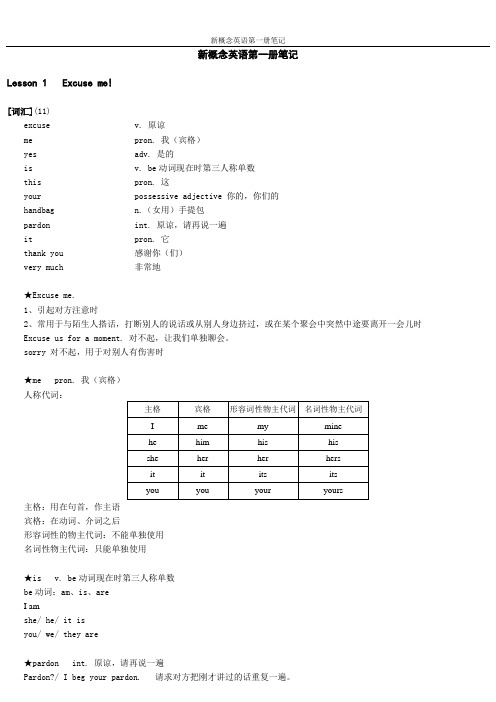
新概念英语第一册笔记Lesson 1 Excuse meexcuse v. 原谅me pron. 我(宾格)yes adv. 是的is v. be动词现在时第三人称单数this pron. 这your possessive adjective 你的,你们的handbag n.(女用)手提包pardon int. 原谅,请再说一遍it pron. 它thank you 感谢你(们)very much 非常地★Excuse me.1、引起对方注意时2、常用于与陌生人搭话,打断别人的说话或从别人身边挤过,或在某个聚会中突然中途要离开一会儿时Excuse us for a moment. 对不起,让我们单独聊会。
sorry 对不起,用于对别人有伤害时★me pron. 我(宾格)人称代词:主格:用在句首,作主语宾格:在动词、介词之后形容词性的物主代词:不能单独使用名词性物主代词:只能单独使用★is v. be动词现在时第三人称单数be动词:am、is、areI amshe/ he/ it isyou/ we/ they are★pardon int. 原谅,请再说一遍Pardon?/ I beg your pardon. 请求对方把刚才讲过的话重复一遍。
[语法]含有be动词的陈述句、否定句和一般疑问句含有be动词的任何句子,否定句就是在be动词后面加not;如果变一般疑问句,就把be动词提前到句子的前面。
[课文]Excuse me.Yes?Is this your handbag?Pardon?Is this your handbag?Yes, it is.Thank you very much.Lesson 2 Is this your…?[词汇](10)pen n.钢笔pencil n.铅笔book n.书watch n.手表coat n.上衣,外衣dress n.连衣裙skirt n.裙子shirt n.衬衣car n.小汽车house n.房子★dress① n. 连衣裙;套裙②n. 服装,衣服casual dress 便服evening dress 晚礼服★house n.房子house 房子,一般指独立的院落,更具体的指房子的建筑,结构family 侧重家庭的成员There are four people in my family. 在我家里有四口人。
新概念英语第一册1-10单元笔记

新概念英语第一册1-10单元笔记Lesson 1 A private conversationLast week I went to the theatre, I had a very good seat, The play was very interesting. I did not enjoy it. A young man and a young woman were sitting behind me. They were talking loudly. I got very angry. I could not hear the actors. I turned round, I looked at the man and the woman angrily. They did not pay any attention. In the end, I could not bear it. I turned round again, ’I can’t hear a word!’ I said angrily.‘It’s none of your business,’ the young man said rudely. ‘This is a private conversation!’1.Key words and expressionsPrivate conversation go to thetheatre talk loudly angry/angrilyTurn round pay attention bear none of your business rudely2.Questions on the text1). Where did the writer go last week?2). Why didn’t he enjoy the play?3). What did the young man say to the writer?3. Language points1). Last week I went to the theatre.go to the cinema/showgo to the bank/post office2). I did not enjoy it(the play).I did not enjoy the meal/book.3). I got very angry. (get---变得)The food is getting cold.4). I could not hear the actors. (hear sb. 听见某人说什么话)Do you hear me?He’s not listening to me. (listen to sb. 强调听动作本身)5). I looked at the young man and the young womanangrily. ( look at 强调的是动作(看))Did you see Sam yesterday? ---- (see 看见)She’s watching TV ------ watch 观看要用watch6). They did not pay any attention (to me).Please pay attention to that picture on thewall.7). In the end, I could not bear it.in the end = at lastbear: stand4Key structures and usage一般过去时过去进行时I had a very good seat.|| A young man and a young woman were sittingbehind me.The play was very interesting.|| They were talking loudly.They did not pay any attention.I could not hear the actors.Lesson 2 breakfast o lunch ?It was Sunday. I never get up early on Sundays. I sometimes stay in bed until lunchtime. Last Sunday I got up very late. I looked out of the window. I was dark outside. ‘What a day!’ I thought. ‘It’s raining again.’ Just then, the telephone rang. It is my aunt Lucy. ‘I’vejust arrived by train,’ she said, ‘I’m coming to see you. ’But I’m still having breakfast, ‘ I said.‘What are you doing?’ She asked. ‘I’m having breakfast,’ I repeated. ‘Dear me,’ she said. ‘Do you get up so late? It’s one o’clock!’1.Key words and expressionsStay in bed until look out of the windowget up early /get up date ring(rang) aunt2. Questions on the text1) What was the weather like last Sunday?2) Who was coming to see the writer?3)Why was the writer’s aunt surprised?3. Language points1) I never get up early on Sundays.I got to the library on Monday afternoons.2) I sometimes stay in bed until lunchtime.The museum is open until 6 pm.I didn’t get up until lunchtime.The rain didn’t stop until evening.3) What a day!What a day it is ! what + nWhat an awful/nice day!How wonderful (it is )! How + adj./advHow surprising (it is )! .4) I’ve just arrived by train.I go to work by bus/by bicycle/on foot every day.5) It was my aunt Lucy. (telephone …. It is )Who is it?It’s me, John.6) I’m coming to see you.Are you leaving soon?He’s going to the theatre this evening.The train is arriving in 5 minutes.7) Dear me!My goodness!Good heavens!4. Key structures and usageI’m never late for appointments.Sometimes he tells us jokes.We often meet at that coffee shopShe is always nice and friendly to peopleAre you still working?I seldom watch TVLesson 3 Please sent me a cardPostcards always spoil my holidays. last summer, I wentto Italy. I visited museums and sat in public gardens. Afriendly waiter taught me a few words of Italian. Then helent me a book. I read a few lines, but I did notunderstand a word. Every day I thought about postcards. My holidays passed quickly, but I did not sent any cards to my friends. On the last day I made a big decision. I got upearly and bought thirty-seven cards. I spent the whole dayin my room, but I did not write a single card!1. Questions on the text1)Where did the writer spend his holidays last summer?2)Why didn’t he enjoy his holidays?3)What did he do on the last day of this holidays?Well, Have you got the main idea about the story?2. Language pointsSpoil v 使索然无味,损坏eg. 1) Don’t spoil the pleasure2) You should not spoil your child. 不要惯坏了你的孩子A friendly waiter taught me a few words of Italian.I’d like to say a few words on the topic.Can I have a word with you?Then he lent me a bookCan I borrow some money from you?Some people neither borrow nor lend.On the last day I made a big decision.Come to a decision/arrive at a decision/reach a decisionI did not write a single card .There wasn’t a single person on the beach3. Key structures and usageHe lent me a book. ------→ He len t a book to me.He sent me a card. -----→ He sent a card to me.Please give him another chance. ---→ Please give another chance to him.He brought his son a present. -----→ He brought a present for his son.Can you get me a few stamps?----→ Can you get a few stamps for me?He made me a breakfast. -----→ He made a breakfast for me.His uncle left him some money. ------→ His uncle left some money to him.She showed her friends her new dress.------→ She showedher new dress to her friends.My advice is relaxed and enjoyed it .Lesson 4 An exciting tripI have just received a letter from my brother, Tim. He is in Australia. He has been there for six months. Tim is an engineer. He is working for a big firm and he has already visited a great number of different places in Australia. He has just bought an Australian car and has gone to Alice Springs, a small town in the centre of Australia. He will soon visit Darwin. From there, he will fly to Perth. My brother has never been abroad before, so he is finding this trip very exciting.1.Key words and expressionsExciting receive a letter firm a greatnumber of different Alice Springs DarwinPerth Abroad2.Questions on the text1). How long has Tim been in Australia ?2). what’s does he do in Australia?3). Why is Tim finding the trip exciting?3. Language points1). He is working for a big firm.Law firm / company2). He has already visited a great number of different places in Australia.a great many people / a great amount of money3). My brother has never been abroad before, so he is finding this trip very exciting.Have you ever been to Hong Kong?Have you ever been there?He has been to the south. ---------- has(have) been to someplace 他去过什么地方(现在可能已经回来了)He has gone to the south. ----------- as(have) gone to someplace 他现在已经去什么地方(还未回来)Go/ travel/ study /live abroadI find this book very interesting.Did you find the film disappointing.I’m planning to take a trip to Tibet next month.4.. Key structures and usage1). I have just received a letter from my brother, Tim.He has been there for six months.He has just bought an Australian car and has gone to Alice Springs. ----- 现在完成时 :has(have)+动名词2). I have just arrived by train. -----和过去完成时连用的副词He has already left.I haven’t heard from him since then.The train has no t arrived yet.The weather has been god so far.Lesson 5 No wrong numbersMr. James Scott has a garage in Silbury and now he has just bought anther garage in Pinhurst. Pinhurst is only five miles from Silbury, but Mr. Scott cannot get a telephone number for his new garage, so he has just bought twelve pigeons. Yesterday, a pigeon carried the first message from Pinhurst to Silbury. The bird cover the distance in three minutes. Up to now, Mr. Scott has sent great many requests for spare parts and other urgent messages from one garage to the other. In this way, he has began his own private ‘telephone’ service.1.Key words and expressionsgarage Silbury Pinhurst Pigeonmessage over distance request sparepart urgent2.Questions on the texts1)What is the problems with Mr. Scott’s secondgarage?2)Why did he buy pigeon?3)What does ‘no wrong numbers’ means?nguage points1). Pinhurst is only five miles from Silbury.The bank is about 5 minutes’ walk away. (这里用了介词away来表示距离)2). Yesterday, a pigeon carried the first message from Pinhurst to Silbury.Can you carry this package to the post office for me please ?3). The bird covered the distance inthree minutes.They have covered 60 miles sinceyesterday morning.4).Up to now, Mr. Scott has sent a greatmany requests for spare parts and other urgent messagesfrom one garage to the other.make a request for something request(sb.) to do something.I request you to consider mysuggestion.on/ upon request (应。
新概念英语第一册101-110课自学笔记(很全、很好)
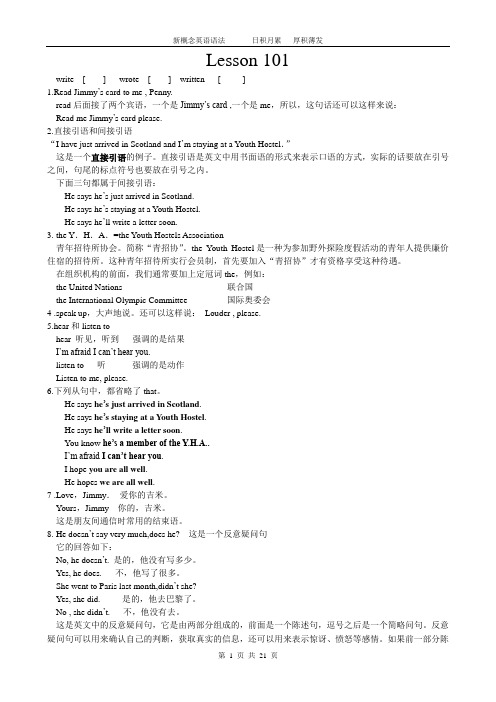
Lesson 101write [ ] wrote [ ] written [ ]1.Read Jimmy’s card to me , Penny.read后面接了两个宾语,一个是Jimmy’s card ,一个是me,所以,这句话还可以这样来说:Read me Jimmy’s card please.2.直接引语和间接引语“I have just arrived in Scotland and I’m staying at a Youth Hostel.”这是一个直接引语的例子。
直接引语是英文中用书面语的形式来表示口语的方式,实际的话要放在引号之间,句尾的标点符号也要放在引号之内。
下面三句都属于间接引语:He says he’s just arrived in Scotland.He says he’s staying at a Youth Hostel.He says he’ll write a letter soon.3. the Y.H.A.=the Youth Hostels Association青年招待所协会。
简称“青招协”。
the Youth Hostel是一种为参加野外探险度假活动的青年人提供廉价住宿的招待所。
这种青年招待所实行会员制,首先要加入“青招协”才有资格享受这种待遇。
在组织机构的前面,我们通常要加上定冠词the,例如:the United Nations 联合国the International Olympic Committee 国际奥委会4 .speak up,大声地说。
还可以这样说:Louder , please.5.hear和listen tohear 听见,听到强调的是结果I’m afraid I can’t hear you.listen to 听强调的是动作Listen to me, please.6.下列从句中,都省略了that。
He says he’s just arrived in Scotland.He says he’s staying at a Youth Hostel.He says he’ll write a letter soon.You know he’s a member of the Y.H.A..I’m afraid I can’t hear you.I hope you are all well.He hopes we are all well.7 .Love,Jimmy.爱你的吉米。
新概念英语第一册111课笔记

新概念英语第一册111课笔记一、词汇。
1. model.- n. 型号;样式;模范;模特儿。
- 例如:This is the latest model of the car.(这是这款汽车的最新型号。
)- She is a fashion model.(她是一名时装模特儿。
)2. afford.- v. 付得起(钱);承担得起(后果);提供。
- 通常用于否定句和疑问句中,常与can, could, be able to连用。
- 例如:I can't afford this expensive watch.(我买不起这块昂贵的手表。
)- We can't afford to make any mistakes.(我们承担不起犯任何错误的后果。
)3. deposit.- n. 定金;存款;沉积物。
- 例如:You need to pay a deposit of 100 dollars.(你需要付100美元的定金。
)- He has a large deposit in the bank.(他在银行有一大笔存款。
)- v. 付(定金);使沉积。
- 例如:I deposited 500 yuan on this apartment.(我为这套公寓付了500元定金。
)- The river deposits a lot of sand at its mouth.(这条河在河口沉积了大量的沙子。
)4. installment.- n. 分期付款;(分期连载的)部分。
- 例如:I bought this TV on installments.(我用分期付款的方式买了这台电视。
)- The story is published in installments.(这个故事分期连载。
)5. price.- n. 价格;代价。
- 例如:The price of this book is 20 yuan.(这本书的价格是20元。
新概念第一册语法知识点汇总(完美版)
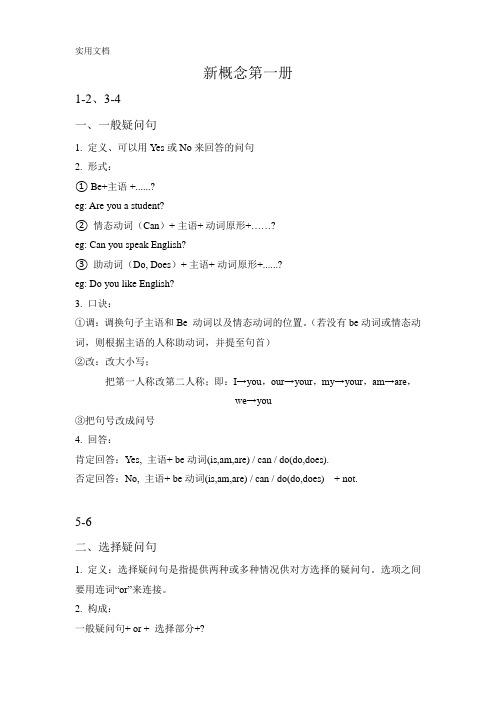
新概念第一册1-2、3-4一、一般疑问句1. 定义、可以用Yes或No来回答的问句2. 形式:① Be+主语 +......?eg: Are you a student?②情态动词(Can)+ 主语+ 动词原形+……?eg: Can you speak English?③助动词(Do, Does)+ 主语+ 动词原形+......?eg: Do you like English?3. 口诀:①调:调换句子主语和Be 动词以及情态动词的位置。
(若没有be动词或情态动词,则根据主语的人称助动词,并提至句首)②改:改大小写;把第一人称改第二人称;即:I→you,our→your,my→your,am→are,we→you③把句号改成问号4. 回答:肯定回答:Yes, 主语+ be动词(is,am,are) / can / do(do,does).否定回答:No, 主语+ be动词(is,am,are) / can / do(do,does) + not.5-6二、选择疑问句1. 定义:选择疑问句是指提供两种或多种情况供对方选择的疑问句。
选项之间要用连词“or”来连接。
2. 构成:一般疑问句+ or + 选择部分+?例:Are you a doctor or a teacher? 你是一个医生还是教师?Does he like this or that? 他喜欢这个还是喜欢那个?Is that coffee yours or hers? 这咖啡是你的还是她的?注:有时候选择部分会用“or not”来表示例:Are you ready or not (ready) ? 你准备好没有?Do you like the film or not? 你喜不喜欢这部电影?7-8、11-12、13-14三、特殊疑问句1. 含义:以特殊疑问词开头的疑问句。
2. 构成:特殊疑问词+一般疑问句+?3. 特殊疑问词总结:(1) what 什么(职业,姓名等)what day 星期几What day is it today? 几天星期几?what size 多大尺码What size are your shoes? 你的鞋码多大?what time 什么时间What time is it now? 现在几点了?what colour 什么颜色What color is your schoolbag? 你的书包是什么颜色?(2) when 什么时候(就时间提问)When will you visit Beijing? 你什么时候去北京玩?(3) where 什么地方(就地点提问)Where is your hometown? 你的家乡在哪?(4) who 谁(问人的身份,姓名等)Who is the girl in red dress? 穿着红裙子的女生是谁?(5) whose 谁的(whose + n.)Whose book is this?这是谁的书?(6) which 哪一个;哪些Which one is your sister ? 哪一个是你姐姐?(7) why 为什么(就原因提问,常用because回答)Why did you break the window?你为什么要打破窗户?(8) how 怎么样How do you go to school? 你怎么去学校?how many多少(提问可数名词数量)How many books do you have ?你有几本书?how much 多少(提问不可数名词数量)How much water is there in the glass?玻璃杯里有多少水?how much 多少钱(提问价格)How much is the ruler? 这把尺子多少钱?how old 几岁(提问年龄)How old are you? 你多少岁了?how long 多长(提问长度)How long is this ruler? 这把尺子有多长?多长时间(时间持续多久)How long do you go to school? 你去学校要多长时间?how often 多久一次(提问频率既单位时间发生多少次)how soon (还要多久时间才能开始或结束)How soon will he come back? 他多久才能回来?how heavy(提问有多重)How heavy is the luggage?这个行李箱有多重?9-10四、祈使句1. 定义:用于表达命令、请求、劝告、警告等的句子叫做祈使句。
(完整版)新概念英语1A知识点总结
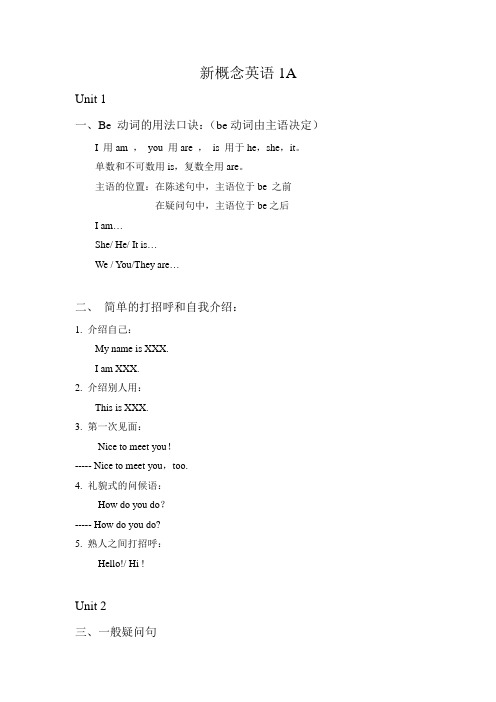
新概念英语1A Unit 1一、Be 动词的用法口诀:(be动词由主语决定)I 用am ,you 用are ,is 用于he,she,it。
单数和不可数用is,复数全用are。
主语的位置:在陈述句中,主语位于be 之前在疑问句中,主语位于be之后I am…She/ He/ It is…We / You/They are…二、简单的打招呼和自我介绍:1. 介绍自己:My name is XXX.I am XXX.2. 介绍别人用:This is XXX.3. 第一次见面:Nice to meet you!----- Nice to meet you,too.4. 礼貌式的问候语:How do you do?----- How do you do?5. 熟人之间打招呼:Hello!/ Hi !Unit 2三、一般疑问句1. 定义(什么叫做一般疑问句):可以用Yes或No来回答的问句。
2. 陈述句变一般疑问句步骤(怎么变?):①调:调换主语与be 的位置到句首。
②改:A:改写大小。
B:该人称:I(我)→you(你),we(我们)→you(你们),my (我的)→your(你的),am(用于I)→are(用于you等复数人称)C:将句号“.”改成问号“?”3. 回答:①肯定回答:Yes,主语+be.②否定回答:No,主语+be+not. (am与not不缩写)例:陈述句:This is my pen. 这是我的钢笔。
一般疑问句:Is this your pen? 这是你的钢笔吗?肯定回答:Yes, it is. 是的,这是我的钢笔。
否定回答:No, it is not(isn’t). 不,这不是我的钢笔。
4. Be动词的否定式:①:Be 的现在式:am , is , are②:Be 的过去式:was ,were③:否定式:is not= isn’t , are not=aren’t , am not无缩写形式四、冠词a/ an 的用法1. a + 以辅音发音开头的单词例:a hat , a man , a university [ˌju:nɪˈvɜ:səti]an + 以元音发音开头的单词例:an apple [ˈæpl] ,an orange [ˈɒrɪndʒ],an egg [eg],an uncle [ˈʌŋkl],an hour [ˈaʊə(r)]2. 单个字母出现在“Mr Li has one fox”中任何一个字母均用an例:an M an H an SUnit 3五、特问词的运用1. 特问词:What 问物(什么)How old 问年龄(多少岁)Who 问人(谁)How many/ much…?多少…?Whose 问谁的How 怎样What colour 问颜色Where 问哪里Which 哪一个(选择)When 问时间(什么时候)=what time2.例子① What is this?(问物)---- It is a bicycle. It is a silver bicycle.② Whose is this umbrella ?(问谁的)---- It’s William’s.③ What colour is Robert’s bicycle? (问颜色+问谁的)---- Robert’s bicycle is silver.六、对划线部分提问的做题技巧1. 选特问词。
新概念英语第一册笔记
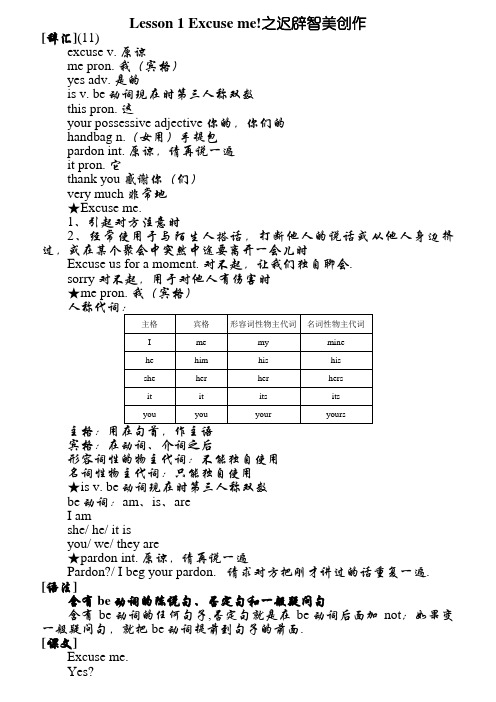
Lesson 1 Excuse me!之迟辟智美创作[辞汇](11)excuse v. 原谅me pron. 我(宾格)yes adv. 是的is v. be动词现在时第三人称双数this pron. 这your possessive adjective 你的,你们的handbag n.(女用)手提包pardon int. 原谅,请再说一遍it pron. 它thank you 感谢你(们)very much 非常地★Excuse me.1、引起对方注意时2、经常使用于与陌生人搭话,打断他人的说话或从他人身边挤过,或在某个聚会中突然中途要离开一会儿时Excuse us for a moment. 对不起,让我们独自聊会.sorry 对不起,用于对他人有伤害时★me pron. 我(宾格)宾格:在动词、介词之后形容词性的物主代词:不能独自使用名词性物主代词:只能独自使用★is v. be动词现在时第三人称双数be动词:am、is、areI amshe/ he/ it isyou/ we/ they are★pardon int. 原谅,请再说一遍Pardon?/ I beg your pardon. 请求对方把刚才讲过的话重复一遍. [语法]含有be动词的陈说句、否定句和一般疑问句含有be动词的任何句子,否定句就是在be动词后面加not;如果变一般疑问句,就把be动词提前到句子的前面.[课文]Excuse me.Yes?Is this your handbag?Pardon?Is this your handbag?Yes, it is.Thank you very much.Lesson 2 Is this your…?[辞汇](10)pen n.钢笔pencil n.铅笔book n.书watch n.手表coat n.上衣,外衣dress n.连衣裙skirt n.裙子shirt n.衬衣car n.小汽车house n.房子★dress①n. 连衣裙;套裙②n. 服装,衣服casual ['kæʒjuəl]dress 燕服 adj. 偶然的,随便的,非正式,漫不经心的evening dress 晚礼服★house n.房子house 房子,一般指自力的院落,更具体的指房子的建筑,结构family 偏重家庭的成员There are four people in my family. 在我家里有四口人.home 笼统的家的概念home road 《我的父亲母亲》Lesson 3 Sorry, sir.[辞汇](10)umbrella n.伞please int.请here adv.这里my possessive adjective 我的ticket n.票number n.号码five num.五sorry adj.对不起的sir n.先生cloakroom n.衣帽寄存处★here adv.这里地址副词:(在英语中,时间副词、地址副词的前面不能加介词)here 这里there 那儿home 家(副词,名词)abroad 国外downstairs 楼底下upstairs 楼上downtown 市中心★five num.五one,two,three,four,five,six,seven,eight,nine,ten★sir n.先生①对不相识的男子、年长者或上级的尊称What can I do for you, sir? 先生,您要买什么?②sir通经常使用于正式信函开头的称号:Dear Sir③ Sir可用于有爵士称号者的名字或姓名前,但不用于姓氏前.madam:女士,夫人Mr.:先生Mrs.:夫人(已婚的)Miss:小姐,一般用于指末婚女子,不外在不知道对方是否已婚时也可使用(两种发音:[mis] 已婚未婚均可;[miz]即不愿意被称为已婚,又不愿意被称为未婚)mister:加在男性的姓氏前面gentleman 绅士,对男性比力有礼貌的称号,在公众场所最得体的称号lady 女士ladies and gentlemenLady first.guy 在美国英语中对男性一种不正式的称号,家伙boy 在美语中不正式的称号 girl 女孩male 男性female['fi:meil]女性雌性的man 男人 woman 妇女[语法]祈使句:祈使句:主语通常不直接暗示出来,其谓语动词用原型,也叫无主句.暗示命令、请求、建议、吩咐等.祈使句真正的主语是你,但省略了.My umbrella and my coat please. 省略了动词和间接宾语的祈使句.Keep off the grass! 请勿践踏草地!Help yourself! 请自己入手!某些祈使动词可以后跟and和另一个祈使动词,而不是后跟带to 的动词不定式结构.Come and see this goldfish.Go and buy yourself a new pair of shoes.去给自己买双新鞋吧.Wait and see. 等着瞧吧.倒装句:here is 是简单的倒装句,be 动词放在here 的后面,这个句式就可以成为简单的倒装句式.My ticket is here. 我的票在这.Here is my ticket. / Here's my ticket.[课文]My coat and my umbrella please.Here is my ticket.Thank you, sir.Number five.Here's your umbrella and your coat.This is not my umbrella.Sorry, sir.Is this your umbrella?No, it isn't.Is this it?Yes, it is.Thank you very much.Lesson 4 Is this your…?[辞汇](5)suit n.一套衣服school n.学校teacher n.老师son n.儿子daughter n.女儿Lesson5 Nice to meet you.[辞汇](14)Mr. 先生good adj.好morning n.早晨Miss 小姐new adj.新的student n.学生French adj.&n.法国人German adj.&n.德国人nice adj.美好的meet v.遇见Japanese adj.&n.日自己Korean adj.&n.韩国人Chinese adj&n.中国人too adv.也★nice adj.美好的① adj. 美好的,好看的It’s a nice day today, isn’t it?② adj. 和蔼的,友好的He is very nice to his neighbours.③ adj. 使人高兴的,令人愉快的It is so nice to have you here.[语法]冠词:冠词数量上暗示“一个”.冠词一共有三个,分为不定冠词和定冠词.1、a, an 是不定冠词:可数名词双数前面必需要用不定冠词a 用在以辅音音素开头的名词前面,an 用于以元音音素(元音发音的单词)开头的名词前面a pen an apple an umbrella an egg an hour a university2、the 是定冠词,暗示特指,有两种发音:[]、[],以元音发音开头的单词前面读[].当想使听话者特别注意the后面的名词时,the就读为[],意思是“这一个而且只是这一个”或“主要是这一个”.定冠词的用法:①特指名词(即以说话人或听话人已知的人或物为前提)时,用theThere is an apple on the desk. The apple is mine.Well, there is a girl in front of the classroom. The girl is my sister.②在专有特殊名词时,用thethe Great Wall,the Summer Palace,the Forbidden City(紫禁城),the sun③在国家前不用冠词,特例国家除外the United States of America[课文]MR. BLAKE: Good morning.STUDENTS: Good morning, Mr. Blake.MR. BLAKE: This is Miss Sophie Dupont.Sophie is a new student. She is French.MR. BLAKE: Sophie, this is Hans. He is German.HANS: Nice to meet you.MR. BLAKE: And this is Naoko. She's Japanese.NAOKO: Nice to meet you.MR. BLAKE: And this is Chang-woo. He's Korean.CHANG-WOO:Nice to meet you.MR. BLAKE: And this is Luming. He is Chinese.LUMNG: Nice to meet you.MR. BLAKE: And this is Xiaohui. She's Chinese, too.XIAOHUI: Nice to meet you.[课文注释]1、英语国家中的姓名通常由三部份组成:名+中间名+姓.一般不用中间姓,在熟人之间以名相称,正式场所用Mr.、Mrs.、Miss(小姐)或Ms.(女士)加姓相称.2、Nice to meet you.用于初度与同学、朋友见面等非正式的场所,一般回答Nice to meet you, too.正式场所经常使用How do you do?回答也是How do you do?Lesson 6 What make is it?[辞汇](13)make n.(产物)牌号Swedish adj.瑞典的English adj.英国的American adj.美国的Italian adj.意年夜利的Volvo []n.沃尔沃(Swedish)Peugeot n.美丽(French)Mercedes []n.梅赛德斯(German)Toyota n.丰田(Japanese)Daewoo n.年夜宇(Korean)Mini n.迷你(English)Ford n.福特(American)Fiat []n.菲亚特(Italian)★make n.(产物的)牌子;类型,型号;式样What make is your watch?Her dress is of Italian make. 她的连衣裙是意年夜利式的★English adj. 英国(人)的;英格兰(人)的;英国化的John is very English. 约翰生活行事非常英国化.[语法]选择疑问句:选择疑问句:在两者或三者中进行选择,用特殊颖问词or进行连接.选择疑问句词调一般是前升后降,选择疑问句的回答必需要用完整的句子回答.Is she a Chinese teacher or a Japanese teacher?She isn't a Chinese teacher. She's a Japanese teacher.Lesson 7 Are you a teacher?[辞汇](10)I pron. 我am v. be动词现在时的第一人称双数are v. be动词现在时复数name n. 名字what adj.&pron. 什么nationality n. 国籍job n. 工作keyboard n. 电脑键盘operator n. 把持人员engineer n. 工程师★nationality n. 国籍nation n. 国家national adj. 国家的,民族的nationality n. 国籍person n. 人personal adj. 个人的personality n. 人品人格★job[] n. 工作①n. 职业,工作,有酬谢的工作,既可以是体力的,也可以是脑力的What is your job?②n. (一件)工作,话计The whole job takes about 40 minutes.③ n. 职责It’s you r job to be on time.Task 指极其困难和棘手的工作work [] n. 工作,广义的概念,泛指的劳动working class 工人阶级★keyboard n. 电脑键盘key []n. 钥匙board []n. 木板blackboard n. 黑板★operator n. 把持人员-or 字母组合,暗示某种人 actor n. 男演员[语法]特殊疑问句:特殊疑问句=特殊疑问词+一般疑问句特殊疑问词:what、where 、who 、when、which、why 、whom、how、how many、how much、how long、how far、how often、how soon what可以用来询问名字、国籍、工作、颜色、型号等:What make is it? 它是什么牌子?What color is it? 它是什么颜色的?What nationality…?What time is it?What size is this skirt?一般疑问句:Be动词+…Do/Does/Did+…Have/Has/Had+…Can及情态动词(must、need、may…)1、所有一般疑问句必需要用升调来读2、一般疑问句可以用简单的Yes/No来回答3、所有一般疑问句用什么来问的就用什么来答[课文]ROBERT:I am a new student.My name's Robert.SOPHIE:Nice to meet you. My name's Sophie.ROBERT:Are you French?SOPHIE:Yes, I am.Are you French, too?ROBERT:No, I am not.SOPHIE:What nationality are you?ROBERT:I'm Italian.Are you a teacher?SOPHIE:No, I'm not.ROBERT:What's your job?SOPHIE:I'm a keyboard operator.What's your job?ROBERT:I'm an engineer.[课文注解]1、Are you French, too?too和either两个词都暗示“也”的意思,too用于肯定句和疑问句中,either仅限用于否定句中.too和either一般放在句末,且前面通经常使用逗号隔开.2、Wha nationality are you?用于询问对方国藉,相当于Where are you from?或Where do youcome from?3、What’s your job?询问对方从事何种职业也可以说:What do you do?Lesson 8 What's your job?[辞汇](10)policeman[] n. 警察policewoman [] n.女警察taxi driver[] n. 出租汽车司机air hostess [] n. 空中小姐postman [] n. 邮递员nurse [] n. 护士mechanic[] n. 机械师hairdresser [] n. 理发师housewife [] n. 家庭妇女milkman [] n. 送牛奶的人★nurse [] n. 护士① n. 护士;照料者②v. 照料;照看All her time goes into nursing her child.她把全部时间都花于照看自己的孩子上了.③v. 养护;培养nurse a young tree 养护树苗nurse an author of promise 培养有前途的作家Lesson 9 How are you today?[辞汇](9)hello int. 喂(暗示问候)hi int. 喂,嗨how adv. 怎样today adv. 今天well adj. 身体好fine adj. 美好的thanks int. 谢谢goodbye int. 再见see v. 见★how adv. 怎样How about that? 怎么会这样?那一个怎么样?How come?=Why? 为什么?How goes it? = How is it going? 事情进展如何?★fineadj. 美好的①健康的;舒适的②极好的,优秀的a fine view 美好的景色③优雅的,雅致的He is a man with fine manners. 他是一个举止优雅的男人.★see v. 见see 暗示看见的结果look 暗示看的举措look at sth. look out of the window look into my eyeswatch 观看移动的一些工具 watch TV[语法]How …?的一些社交上的用法:1、用于询问健康状况或一般生活情况:How are you? /How have you been? 你一向可好?2、How do you do ?是正式介绍中的一句套话,从不用来询问健康.3、How经经常使用在询问目前状况的疑问句里:How’s life? 生活如何?How are things? 情况怎样?How’s work? 工作怎么样?形容词的意义与作用:1、形容词修饰名词所指的人、物等,说明人、物等是什么样或看上去是什么样的.2、许多形容词可用以回答What’s…like?这样的问题,并可根据上下文给出笼统或确切的信息.W hat’s Tom like?He’s very fat.3、英语中形容词作定语时一般置于名词之前.[课文]STEVEN:Hello, Helen.HELEN: Hi, Steven.STEVEN:How are you today?HELEN: I'm very well, thank you. And you?STEVEN:I'm fine, thanks.How is Tony?HELEN: He's fine, thanks.How's Emma?STEVEN:She's very well, too, Helen.Goodbye, Helen. Nice to see you.HELEN: Nice to see you, too, Steven.Goodbye.Lesson 10 Look at…[辞汇](13)fat adj. 胖的woman n. 女人thin adj. 瘦的tall adj. 高的short adj. 矮的dirty adj. 脏的clean adj. 干净的hot adj. 热的cold adj. 冷的old adj. 老的young adj. 年轻的busy adj. 忙的lazy adj. 懒的★look①看,瞧,观,望Look carefully before you cross the street.过马路前要仔细看清来往车辆.②面向,朝向The room looks on the sea. 房间面向年夜海.Two windows look to the south. 两扇窗子朝南.Lesson 11 Is this your shirt?[辞汇](5)whose pron. 谁的blue adj. 蓝色的perhaps adv. 年夜概white adj. 白色的catch v. 抓住★whose pron. 谁的whose(特殊疑问词):用于询问所有关系.对形容词性物主代词、名词性物主代词、名词所有格的两种情况(形容词性和名词性)进行提问.★blue adj. 蓝色的①蓝色的,蔚蓝的②沮丧的,忧郁的His mood is blue. 他的情绪高涨.He looks a bit blue. 他看上去有点儿忧郁.★catch v. 抓住① v. 接住,拦住② v. 逮住,捕捉 catch a thief③v. 染上(疾病)I have caught a bad cold. 我得了重感冒.[语法]所有格形容词和所有格代词:所有格形容词与所有格代词都暗示所有,即某人或某物属于某一个人,回答以whose引导的问句.所有格形容词my、your等是限定词,必需始终放在名词之前,只能作定语,它们的形式取决于所有者,而不是被拥有的工具.所有格代词mine、yours等不能用在名词前,而且在说话时要加重语气,它们指人或物,双数或复数都一样,在句中作主语、宾语、表语用.I have my way, and she has hers.名词所有格:名词所有格与名词有关(与所有格形容词和所有格代词有关),名词+’s:暗示……的,如:Tim's、Jones'、boss's.名词所有格有两种属性:形容词性、名词性This is Tim's shirt. (形容词性)This shirt is Tim's. (名词性)[课文]TEACHER:Whose shirt is that?Is this your shirt, Dave?DAVE: No. Sir. It's not my shirt.This is my shirt. My shirt's blue.TEACHER:Is this shirt Tim's?DAVE: Perhaps it is, sir. Tim's shirt's white.TEACHER:Tim!TIM: Yes, sir?TEACHER:Is this your shirt?TIM: Yes, sir.TEACHER:Here you are. Catch!TIM: Thank you, sir.[课文注解]Here you are. 给你这是给对方工具时的用语,也可用Here it is.或Here they are.(指复数的物).句中的are和is一般应重读.Lesson 12Whose is this…? This is my/your/his/her…Whose is that…? That is my/your/his/her…[辞汇](8)father n. 父亲mother n. 母亲blouse n. 女衬衫sister n. 姐,妹tie n. 领带brother n. 兄,弟his possessive adjective. 他的her possessive adjective. 她的Lesson 13 A new dress[辞汇](8)colour n. 颜色=color(美)green adj. 绿色come v. 来upstairs adj. 楼上smart adj. 时髦的,巧妙的hat n. 帽子same adj. 相同的lovely adj. 可爱的★colour n. 颜色=color(美)what colour is…?What make is …? 什么车牌?★come v. 来come on:快点来;奉求,得了吧;过来Come on. I’m not 18 years old again. 奉求,得了吧.go:去,加油★smart adj. 时髦的,巧妙的①漂亮的,时髦的,巧妙的You look smart in that new dress.②聪慧的,伶俐的,精明的He is a smart businessman.[课文]LOUISE:What colour's your new dress?ANNA: It's green.Come upstairs and see it.LOUISE:Thank you.ANNA: Look! Here it is!LOUISE:That's a nice dress.It's very smart.ANNA: My hat's new, too.LOUISE:What colour is it?ANNA: It's the same colour.It's green, too.LOUISE:That is a lovely hat![课文注释]It’s the same colour. 一样的颜色.same通常与定冠词the连用,暗示“同一的”、“相同的”two boys of the same age 两个同龄的男孩子Lesson 14 What colour's your…?[辞汇](3)casen. 箱子carpetn. 地毯。
- 1、下载文档前请自行甄别文档内容的完整性,平台不提供额外的编辑、内容补充、找答案等附加服务。
- 2、"仅部分预览"的文档,不可在线预览部分如存在完整性等问题,可反馈申请退款(可完整预览的文档不适用该条件!)。
- 3、如文档侵犯您的权益,请联系客服反馈,我们会尽快为您处理(人工客服工作时间:9:00-18:30)。
新概念英语第一册笔记完整版΄1)v. 原谅΄eg. Excuse me. 请原谅,劳驾。
2)n. 借口΄eg.It΄s an excuse.΄me pron. 我(宾格:用来做宾语的。
)΄eg. He loves me.他爱我.΄eg. She cheats me.他骗我.΄eg. Please tell me.他告诉我.Excuse me 的用法这个短语经常被译作―对不起‖,但它并不表示你有什么过错,而是说你要打搅别人,所以常被译作―劳驾‖。
1)为了要引起别人的注意΄eg. Excuse me. Is this you handbag?2)要打扰某人或要打断别人话΄eg. Excuse me . May I ask you a question?3) 向陌生人问路΄eg. Excuse me. Could you please tell me the way to the railway station?4) 向某人借东西΄eg. Excuse me. Can I borrow your pen?5) 需要从别人身边挤过或让别人给自己让路΄eg. Excuse me. Could you please make some room for me?6) 要求在宴席或会议中途中离开一会儿eg. Excuse me. May I lease for a little while?΄sorry用于当你做错事而向别人道歉的时候,表示―对不起‖。
1)请问几点了?΄eg. Excuse me. What time is it?2) 不小心把水弄到了别人的身上。
΄eg. Sorry. 或者I΄m sorry!3) 对不起,我先失陪一下΄eg. Excuse me.4) 误解了别人的意思΄eg. Sorry. ΄yes1) adv. 是的(对一般疑问句的肯定回答)΄eg. Are you mad? --Yes, I am.2)经常用于应答,表示―什么事‖。
΄eg. Excuse me?请问/劳驾?---Yes? 什么事?--我准备把它带给我的姐姐。
I‘m going to take it to my sister.--你打算怎样处理这些花?What are you going to do with these flowers?--我打算把这些花送给我奶奶。
--I‘m going to give them to my grandmother.--你打算把这些画片怎么样?What are you going to do with these pictures?--我要把它们给我的姐姐看。
I‘m going to show them to my sister.接双宾语的词--show/ send/ take/ give当sth 用代词it/ them 来代替时,只能用show/ send/ take/ give/ it/ them to sb.Lessen 41--cheese n. 乳酪,干酪(不可数名词)--a piece of cheese 一块乳酪--three pieces of cheese 三块乳酪--There is some cheese on the plate. 在盘子里有一些乳酪。
--bread n. 面包(不可数名词)--a loaf of bread 一块未切好的面包 --two loaves of bread 两大块面包--a piece of bread 一片面包--There are some pieces of bread on the plate. 在盘里有几片面包。
--noodle 面条,一般常用复数形式 noodles --dumpling 饺子--sandwich n. 三明治 --hamburger n. 汉堡包 --soap n.肥皂--a bar of soap 一块肥皂 --five bars of soap 五块肥皂--There is some soap in the box. 在盒子里有一些香皂。
--soup n. 汤(不可数名词) --soap bubble 肥皂泡--chocolate n.巧克力(不可数名词) --a bar of chocolate 一块巧克力--Are there four bars of chocolate in the box? 在盒子里有没有四块巧克力? --Yes, there are. --No, there aren‘t.--Don‘t eat chocolate before dinner. 饭前不要吃巧克力。
(祈使句的否定形式) --sugar n. 糖(不可数名词) --a pound of sugar 一磅白糖 --six pounds of sugar 六磅白糖 --some sugar 一些白糖 --sweets 糖果(Br.) --candy 糖果(Am.)--coffee n. 咖啡(不可数名词) --Is there any coffee in the cup?--black coffee: coffee without milk 不加牛奶的咖啡 --white coffee 加牛奶的咖啡 --tea n. 茶(不可数名词)--There isn‘t any tea in the cup. 茶杯里没有茶了. --tobacco n. 烟草,烟丝(不可数名词) --a tin of tobacco 一听烟丝--Give me three tins of tobacco. 给我三听烟丝。
--cigarette n. 香烟(可数名词) --a pack of cigarettes 一盒香烟 Questions:Who is the tin of tobacco for? 那听烟丝是给谁买的?It is for you, Sam. The tin of tobacco is for Sam. Not very. 省略形式全句:It is not very heavy. What‘s in it? 里面有什么东西?在不知道里面有什么东西的情况下,我们一般用系动词单数形式is,而不用are. --What is in your handbag? 你的手提包里是什么东西?(问的时候并不知道包里有些什么东西所以用单数) --Three books. 三本书。
--who 用法相同--Who‘s in the room? 谁在房间里?(问的时候并不知道房间里有几个人,所以用单数) --My parents. 我的父母。
--three pieces of cheese 三块乳酪(复数加在量词piece的后面) --piece 还可以指条、片、张等 --a piece of paper 一张纸--a loaf of bread 一个面包(指西餐中要切成片吃的块面包) --pound1) 磅(重量单位)--three pounds of sugar 三磅糖 2)英磅(货币单位) --one pound 一英磅 --three pounds 三英磅 --half 一半--half a pound 半磅 --half a year 半年 --half a pound of sth--quarter 1/4, 一刻钟,一个季度 --a quarter of……的1/4--a quarter of a pound 一磅的1/4(即1/4磅) --a quarter of a pound of tea 1/4磅的茶叶 Is that tin of tobacco for me?--for 给…, 为…(后面名词或代词宾格)--This bottle of milk is for him. 这瓶牛奶是给他的。
--This bar of chocolate is for Susan. 这块巧克力是苏珊的。
--certainly 当然 --of course --surely (Am.)It‘s certainly not for me. It‘s of course not for me. It‘s surely not for me.--cheese/ bread/ soap/ chocolate/ milk/ sugar/ coffee/ tea/ tobacco这些词都是不可数名词。
不可数名词前面不能加不定冠词―a‖或―an‖,它们也没有复数形式。
表示数理的短语有: --a piece of --a loaf of --a bar of --a bottle of --a pound of --a tin of 表示复数概念时在量词上起变化: --tow tins of tobacco --bird n. 鸟--Some bird are flying over the river. 一些鸟正在飞越这条河。
--Kill two birds with one stone.一箭双雕 --The early bird gets the worm. --any 一些 --some 一些--any/ some 一些,后面都可以加可数名词复数形式也可以加不可数名词,some一般用在肯定句,any用于否定句和疑问句。
--There are some books on the desk. --Are there any books on the desk. 小结1) there is + 单数可数名词/不可数名词 --there are + 可数名词复数形式当there be 后面跟几个并列名词时,我们要根据就近原则来确定be 的单得数形式。
--There is a pen and two books on the desk. --There are two books and a pen on the desk. 2) some 与any 都可接可数复数名词和不可数名词--some一般用于肯定句中,any 用于否定和疑问句中3)不可数名词没有复数形式,前面不可以加不定冠词―a‖或―an‖. 4)一些量词的用法,表示复数概念要在量词本身起变化。
Lesson 43--of course 当然--certainly / surely (Am.) --kettle n. 水壶--behind prep. 在…的后面--A pretty girl is sitting behind me(me 做behind 的宾语). 一个漂亮的女孩坐在我的后面。
--behind-------------after--behind 是指方位的前后在….的后面--Put the clothes tree behind the door. 把衣架放在门后。
